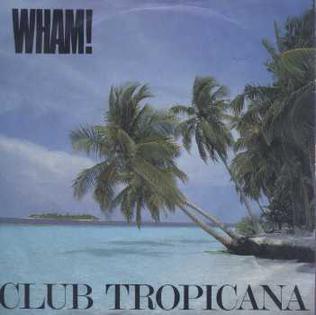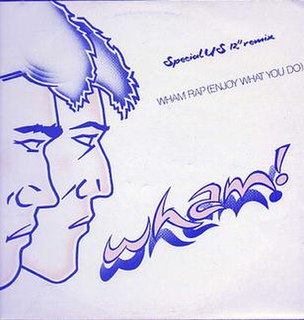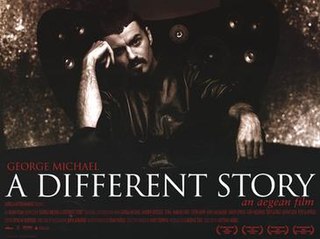Related Research Articles

George Michael was an English singer, songwriter, record producer, and philanthropist who rose to fame as a member of the music duo Wham! and later embarked on a solo career. Michael sold over 80 million records worldwide making him one of the best-selling music artists of all time. He achieved seven number one songs on the UK Singles Chart and eight number one songs on the US Billboard Hot 100. Michael won various music awards including two Grammy Awards, three Brit Awards, three American Music Awards, 12 Billboard Music Awards, four MTV Video Music Awards and six Ivor Novello Awards. In 2008, he was ranked 40th on Billboard's list of the Greatest Hot 100 Artists of All Time.

EMI Group Limited was a British transnational conglomerate founded in March 1931 in London. At the time of its break-up in 2012, it was the fourth largest business group and record label conglomerate in the music industry, and was one of the "Big Four" record companies. Its labels included EMI Records, Parlophone, Virgin Records, and Capitol Records, which are now owned by other companies.
A record label, or record company, is a brand or trademark of music recordings and music videos, or the company that owns it. Sometimes, a record label is also a publishing company that manages such brands and trademarks, coordinates the production, manufacture, distribution, marketing, promotion, and enforcement of copyright for sound recordings and music videos, while also conducting talent scouting and development of new artists, and maintaining contracts with recording artists and their managers. The term "record label" derives from the circular label in the center of a vinyl record which prominently displays the manufacturer's name, along with other information. Within the mainstream music industry, recording artists have traditionally been reliant upon record labels to broaden their consumer base, market their albums, and promote their singles on streaming services, radio, and television. Record labels also provide publicists, who assist performers in gaining positive media coverage, and arrange for their merchandise to be available via stores and other media outlets.

Elektra Records is an American record label owned by Warner Music Group, founded in 1950 by Jac Holzman and Paul Rickolt. It played an important role in the development of contemporary folk music and rock music between the 1950s and 1970s. In 2004, it was consolidated into WMG's Atlantic Records Group. After five years of dormancy, the label was revived as an imprint of Atlantic in 2009. In October 2018, Elektra was detached from the Atlantic Records umbrella and reorganized into Elektra Music Group, once again operating as an independently managed frontline label of Warner Music.

Epic Records is an American record label owned by Sony Music Entertainment, a subsidiary of Sony Corporation of America, the North American division of Japanese conglomerate Sony. The label was founded predominantly as a jazz and classical music label in 1953, but later expanded its scope to include a more diverse range of genres, including pop, R&B, rock, and hip hop. Epic Records has released music by major artists.

Andrew John Ridgeley is an English singer, songwriter, and record producer, best known for his work in the 1980s as one half of the musical duo Wham!

Sony Music Entertainment is an American global music company, which is part of the Sony Music Group owned by conglomerate Sony Corporation of America, incorporated as a general partnership of Sony Music Holdings Inc. through Sony Entertainment, all of which are ultimately owned by the Japanese conglomerate Sony.

Wham! were an English pop duo consisting of George Michael and Andrew Ridgeley, formed in Bushey in 1981. They became one of the most commercially successful pop acts of the 1980s, selling more than 30 million certified records worldwide from 1982 to 1986.

Listen Without Prejudice Vol. 1 is the second solo studio album by the English singer-songwriter George Michael, released on 3 September 1990. The album was Michael's final album of all-new material on Columbia Records until 2004's Patience. Disappointing album sales in the US led to Michael's legal battles against Sony Music, in which he accused the corporation of not fully supporting him as an artist.

"Club Tropicana" is a song by English pop duo Wham!, released in 1983 on Innervision Records. It was written by members George Michael and Andrew Ridgeley.
A recording contract is a legal agreement between a record label and a recording artist, where the artist makes a record for the label to sell and promote. Artists under contract are normally only allowed to record for that label exclusively; guest appearances on other artists' records will carry a notice "By courtesy of ", and that label may receive a percentage of sales.

Fantastic is the debut studio album by British pop duo Wham! released on 9 July 1983. It reached number one on the UK Albums Chart. It included the previously released singles "Young Guns", "Wham! Rap" and "Bad Boys". "Club Tropicana" was released as a single to coincide with the album's release. Although not on the album "Club Fantastic Megamix" was released against the band's wishes by Innervision soon after Fantastic, and whilst they were in proceedings to leave the label.

"Everything She Wants" is a song by British pop duo Wham!, originally released as a single in 1984 on Epic Records on a double A-side with "Last Christmas". It was written and produced by George Michael, one half of the duo, becoming their third consecutive million-selling number-one hit in the United States.

"Bad Boys" is a song by English pop duo Wham! which was a hit in 1983. It was written and co-produced by George Michael, one half of the duo, and released on Innervision Records.

"Wham Rap! " is the debut single by English pop duo Wham! on Innervision Records, released in 1982. It was written by Wham! members George Michael and Andrew Ridgeley.

Legacy Recordings is an American record label that is a division of Sony Music. Formed in 1990 after Sony's acquisition of CBS Records, Legacy originally handled the archives of Sony Music-owned labels Columbia Records and Epic Records. In 2004, under the Sony BMG joint venture, the label began to manage the archives of RCA Records, J Records, Windham Hill Records, Arista, LaFace, Jive, and Buddah Records. Legacy Recordings now also handles Philadelphia International Records and the catalog of recordings produced by Phil Spector. It is not to be confused with the defunct British independent label Legacy Records.

Nordenfelt v Maxim Nordenfelt Guns and Ammunition Co Ltd [1894] AC 535 is a 19th-century English case decided by the House of Lords. The dispute was about restraint of trade, and the judgment declares when such a restraint may become valid.
Innervision Records was an independent record label distributed by CBS Records. The label was established around 1981 by Mark Dean and Shamsi Ahmed. Perhaps the most recognizable artist associated with Innervision was Wham!, who scored four top-ten hits while signed to the label. Additional Innervision artists included Jimmy The Hoover, who had a top 20 hit with "Tantalise"; and the groups Animal Nightlife, The Promise, Girl Talk and Space Monkey. Innervision released its final single in 1985, by which time the label's records were being distributed by EMI.

"Club Fantastic Megamix" was a single released by Wham! in 1983, and was the last single release for the duo on Innervision Records. It was approved by Mark Dean, the manager of Innervision Records. The single was released three months after Wham! had begun proceedings to leave the label, and was disapproved of by George Michael and Andrew Ridgeley. The single, which consisted of a mix of the tracks "A Ray of Sunshine", "Love Machine", and "Come On" from the album Fantastic, reached number 15 on the UK Singles Chart.

George Michael: A Different Story is a 2004 documentary film about the English singer, songwriter and record producer George Michael. It follows Michael's life from joining Wham! in 1981, to the present-day covering his career as a solo artist including personal and professional gain and loss. The film is a British venture produced by Aegean Films with Gorilla Entertainment Limited serving as distributor.
References
- 1 2 3 4 5 6 7 8 Coulthard, Alan (1995). "George Michael v Sony Music – A Challenge to Artistic Freedom?". The Modern Law Review. 58 (5): 731–744. doi: 10.1111/j.1468-2230.1995.tb02047.x .
- 1 2 Ipsen, Erik (19 October 1993). "Sony Suit Plays High Court". New York Times. Retrieved 28 January 2012.
- 1 2 3 Smith, Giles (22 June 1994). "'Pop slave' George Michael to fight on". The Independent. Retrieved 28 January 2012.
- 1 2 Stevenson, Richard W. (22 June 1994). "George Michael Loses Lawsuit Against Sony". New York Times. Retrieved 28 January 2012.
- 1 2 Lister, David (19 October 1993). "George Michael and Sony face the music: Rock star's High Court contract case could shake the recording industry to its foundations". The Independent. Retrieved 28 January 2012.
- 1 2 Tan, Ying Hui (24 June 1994). "Law Report: Recording agreement enforceable: Panayiotou and others v Sony Music Entertainment (UK) Ltd – Chancery Division (Mr Justice Jonathan Parker), 1 June 1994". The Independent. Retrieved 28 January 2012.
- ↑ Under the first wing of Nordenfelt v Maxim, Nordenfelt Guns and Ammunition Co Ltd and in contrast to ZTT v Holly Johnson .